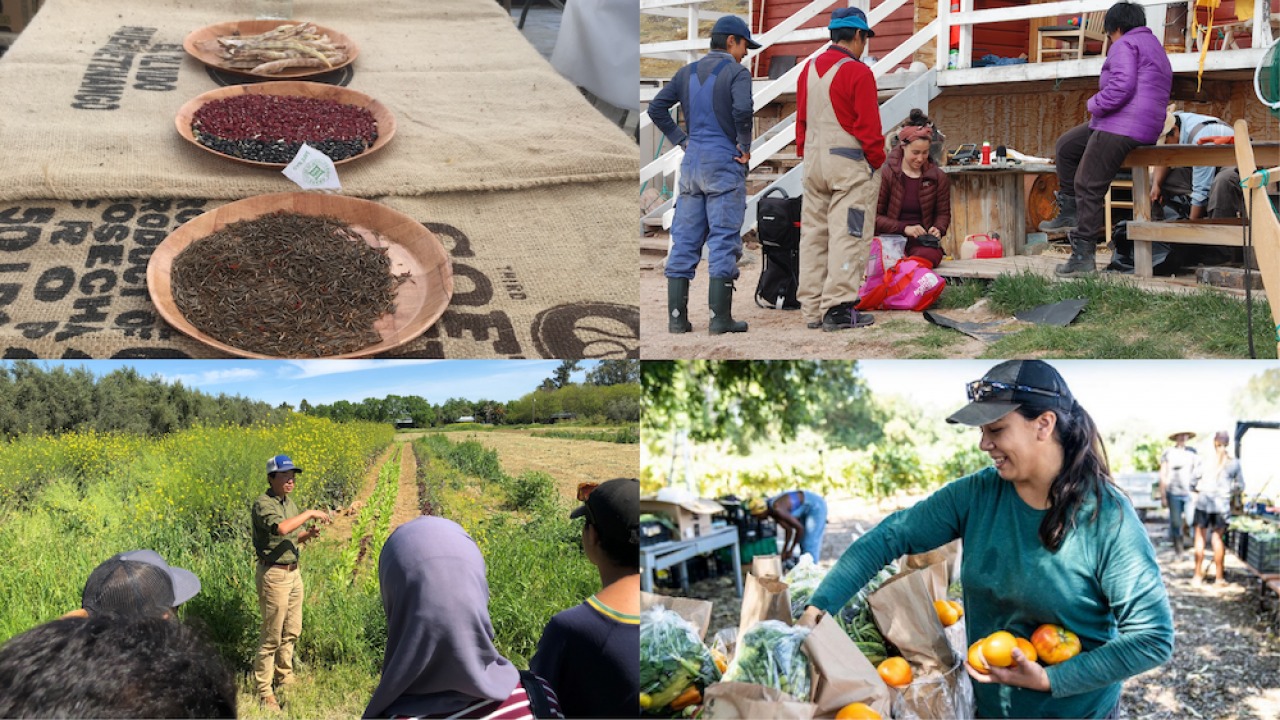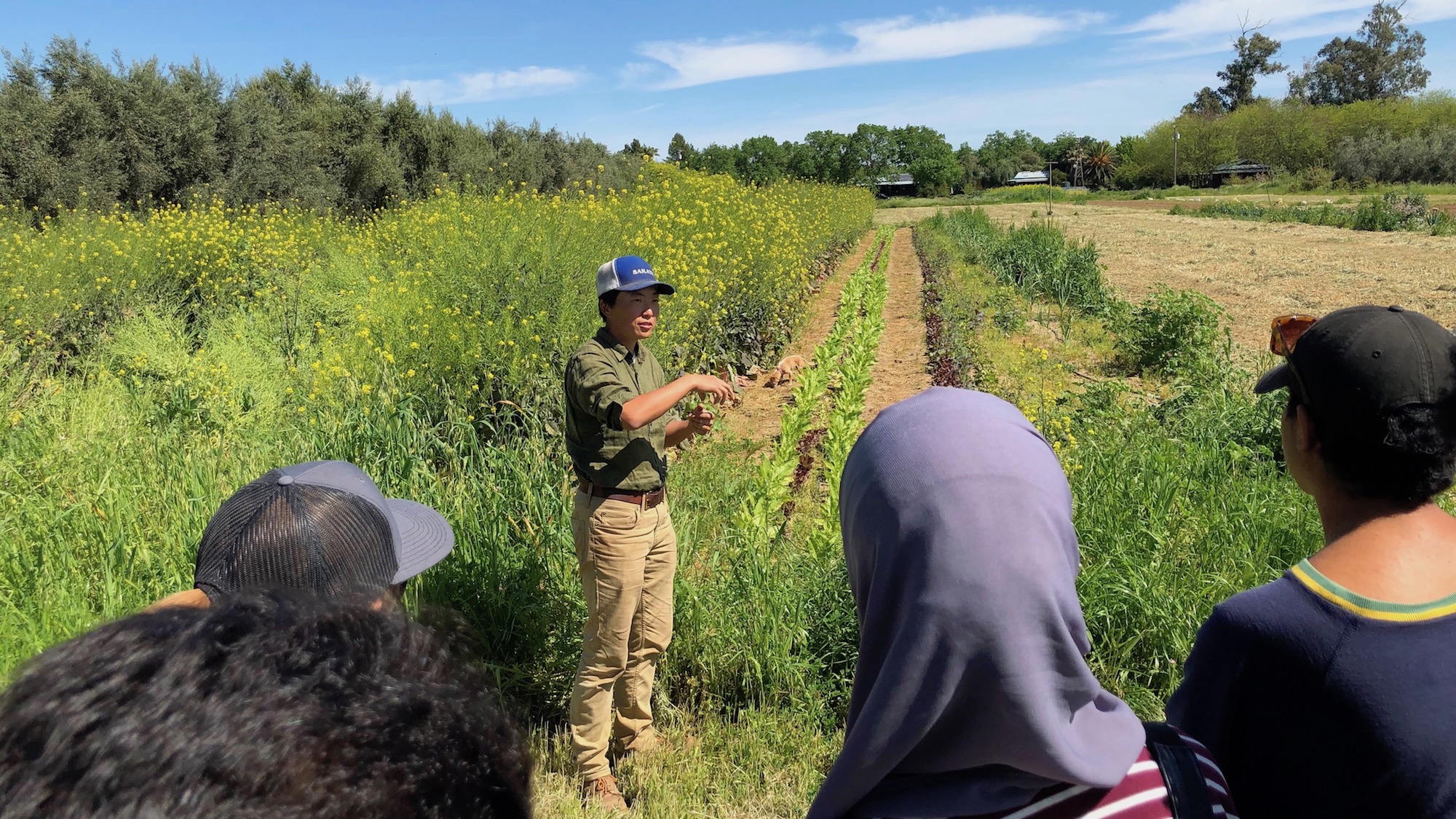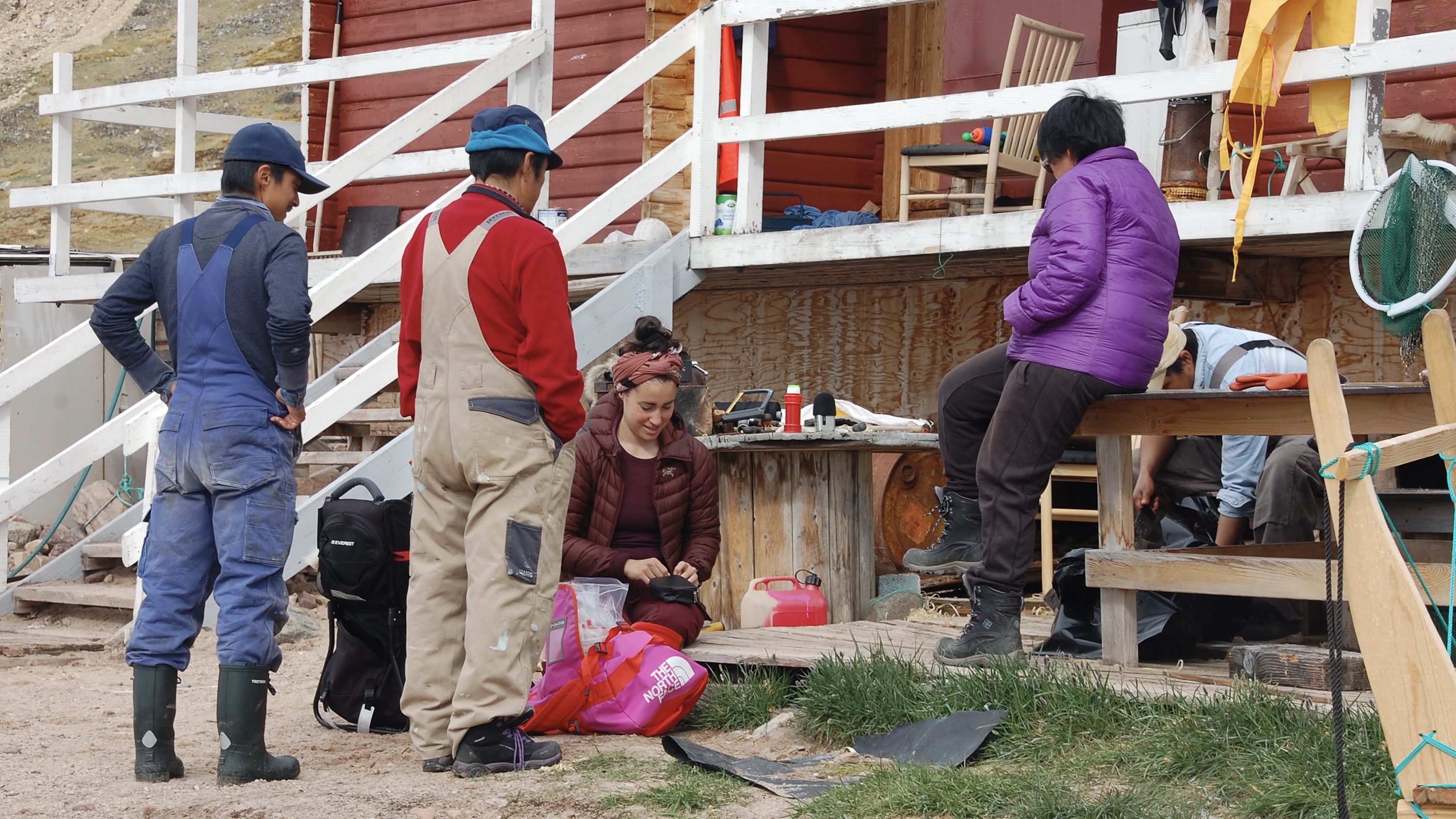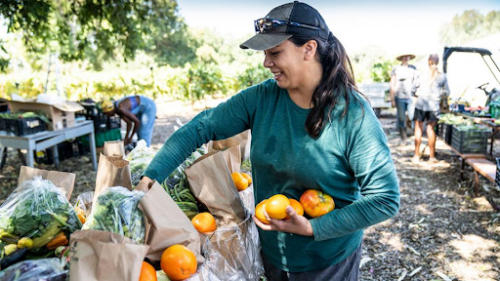
2021 Grants for Advancing Sustainable Development Support Collaborations Locally and Globally
By Bonnie Shea, executive director of communications and marketing, Global Affairs
Seven grant projects are advancing 11 of the 17 Sustainable Development Goals to achieve a better future
The sixth annual International Connections Reception, hosted by Global Affairs on March 4, brought together the UC Davis community in an online forum to celebrate several award and grant programs, including the announcement of the 2021 recipients of Grants for Advancing Sustainable Development Goals.
This year, Global Affairs offered these grants as a part of a growing partnership with the UC Davis Office of Diversity, Equity, and Inclusion, and Sustainability office. These team-focused grants of up to $7,500 fund global and multidisciplinary programs that enhance UC Davis’ connections to the UN Sustainable Development Goals (SDGs).
The 17 UN SDGs include goals such as ending hunger, ensuring clean water, combating climate change, and eradicating inequalities. They provide a globally-recognized framework and a common language to achieve sustainable development across economic, social and environmental dimensions. This year’s seven selected projects contribute to 11 of the 17 SDGs—locally and globally—bringing together more than 20 faculty, researchers, and students from across UC Davis and collaborating institutions worldwide.
One grant was reserved for a project that is clearly focused on SDG 10.3: “Ensure equal opportunity and reduce inequalities of outcome, including by eliminating discriminatory laws, policies, and practices and promoting appropriate legislation, policies, and action in this regard.” Two grants were reserved for CAMPOS and CAMPSSAH Scholars, who have as their mission to encompass the multicultural perspectives of academic faculty in STEM as well as in the social sciences, arts, and humanities—while focusing on expanding the presence of women and underrepresented faculty in those disciplines.
2021 Grants for Advancing Sustainable Development Goals Projects
Culturally Diverse Participatory Public Plant Breeding: Supporting Farmers of the Asian Diaspora
Ga Young Chung, an assistant professor of Asian American studies in the College of Letters and Science, E. Charles Brummer, a professor of plant sciences and director of the Center for Plant Breeding in the College of Agricultural and Environmental Sciences, and Katharina Ullmann, director of the Student Farm in the Agricultural Sustainability Institute, earned a grant for their project addressing SDG 2: Zero Hunger, SDG 4: Quality Education, and SDG 10: Reduced Inequalities.
The team plans to build a collaboration between UC Davis’ Departments of Plant Sciences and Asian American Studies, the UC Davis Student Farm, along with Namu Farm, a farm focused on Korean vegetables based in Winters, California, and the state’s Asian Diaspora community. Since the diets of people around the world are culturally diverse, the team hopes to build more understanding and begin to develop a public breeding program that accounts for culturally relevant foods, addresses food security, and broadens the education of UC Davis students in participating in this work.

Migrant Citizenship for Inclusive Societies
Jeannette Money, a professor of political science in the College of Letters and Science, and Gabriel ‘Jack’ Chin, the Edward L. Barrett, Jr. Chair and Martin Luther King, Jr. Professor in the School of Law, are using their grant to collaborate with colleagues Anna Boucher from the University of Sydney in Australia and Le Ahn Nguyen Long from the University of Twente in The Netherlands in pursuit of SDG 10: Reduced Inequalities and SDG 16: Peace, Justice, and Strong Institutions. Their project was selected as the one particularly focused on SDG 10.3 to ensure equal opportunity and reduce inequalities of outcome.
Knowing access to citizenship represents one important avenue for providing migrants with equal opportunity within an inclusive society, the team’s project seeks to identify and help international migrants navigate legal barriers to acquiring citizenships. The team plans to build institutional partnerships while combining theoretical and policy components to identify determinants of states’ naturalization legislation and to better understand migrant decision-making on whether or not to naturalize. These findings will helpgenerate recommendations to facilitate change and to enhance knowledge of citizenship opportunities.
Groundwater Quality and Water Security Under a Changing Climate
Jasquelin Peña, an associate professor of civil and environmental engineering in the College of Engineering and a CAMPOS Scholar, and Heather Bischel, an assistant professor of civil and environmental engineering in the College of Engineering, are teaming up with Humberto Marotta, an associate professor from Universidade Federal Fluminense in Brazil, to contribute to SDG 3: Good Health and Well-Being and SDG 6: Clean Water and Sanitation.
The international team of collaborators from across Brazil, Switzerland, and the United States is addressing water security by examining biogeochemical processes, ecosystem services, and human health in Amazonian floodplains. By studying the sources, dynamics, and concentrations of elements like arsenic, manganese, and iron in water, the team aims to help communities identify safe drinking water in addition to water wells that might become vulnerable. The research will also inform a Global Learning Seminar for students as a part of the First-Year Seminars program.
Community Mentorship Program Pilot for Radical and Relational Approaches to Inuit Food Security
Jessica Bissett Perea, assistant professor of Native American studies in the College of Letters and Science, and Maria Marco, professor of food science and technology in the College of Agricultural and Environmental Sciences, and Stephanie Maroney, postdoctoral scholar and program manager for the Mellon Public Scholars Program in the Humanities Institute, are collaborating with Aviaja Hauptmann, a postdoctoral scholar from the University of Greenland, to contribute to SDG 2: Zero Hunger, SDG 3: Good Health and Well-Being, SDG 10: Reduced Inequalities, SDG 16: Peace, Justice, and Strong Institutions, and SDG 17: Partnerships.
The team is using the grant to engage in inclusive and collaborative transdisciplinary research with international communities and university partners to better understand, document, and share traditional Inuit subsistence lifeways and food preparation methods as a means to advance food security in the circumpolar Arctic. Their work blends scientific approaches, such as emphasizing microbiology in homes, with arts and humanities approaches that are Indigenous-led and Indigeneity-centered.

Healthier Lives, Healthier Planet
Francene Steinberg, chair and professor of nutrition in the College of Agricultural and Environmental Sciences, and Mark Cooper, assistant professor of community and regional development in the College of Agricultural and Environmental Sciences, are using their grant to collaborate with John Mathers, professor of human nutrition at Newcastle University in the United Kingdom, to further institutional partnerships and advance SDGs 2: Zero Hunger, SDG 3: Good Health and Well-Being, and SDG 13: Climate Action.
UC Davis and Newcastle University will co-develop and co-deliver a graduate course to be offered online simultaneously at both universities and that will later potentially be offered to other international partners. The course will aim to challenge students to see their work related to global contexts—such as human health and wellbeing, global food systems, and climate change—and to develop skills to that contribute to healthier people and to a healthier planet.
Student Farms Around the World: Learning While Feeding Communities

Katharina Ullmann, director of the Student Farm in the Agricultural Sustainability Institute, Maria Cecilia Colombi, a professor of Spanish in the College of Letters and Science, and Amanda Crump, an assistant professor of plant sciences in the College of Agricultural and Environmental Sciences, are using their grant to contribute towards several SDGs: 2: Zero Hunger, 10: Reduced inequalities, 11: Sustainable Cities and Communities, 12: Responsible Consumption and Production, and 13: Climate Action.
Their project brings together student farms and student farmers at UC Davis and the University of Talca in Chile to understand challenges, help each other using interdisciplinary and systems-based perspectives, and organize a Global Student Farm Symposium, building on work underway in collaboration with the Global Education for All Student Fellows. In addition to focusing on food production, the international collaboration will center around agroecological principles, community, and recognizing students as key leaders in pushing boundaries.
Developing an Interdisciplinary Framework to Study the Sustainability of Marine Ecosystems in Chile and California
Fernanda Valdovinos, assistant professor of environmental science and policy in the College of Agricultural and Environmental Sciences and a CAMPOS Scholar, John Largier, professor of environmental science and policy and associate director of international programs at the Coastal and Marine Sciences Institute in the College of Agricultural and Environmental Sciences, are collaborating with their colleague Sergio Navarrete from the Estación Costera de Investigaciones Marinas at Pontificia Universidad Católica de Chile to contribute to SDG 14: Life Below Water.
The team plans to generate an interdisciplinary framework that will integrate food web modeling, empirical data, and the modeling of the physical aspects of marine ecosystems to evaluate how marine ecosystems respond to different scenarios of fisheries and climate change in Chile and California. This project will support two graduate students and a postdoctoral researcher, who will lead the framework development, publication writing, and develop a mini-course to train 40 undergraduate and graduate students from both universities.
2021 Global Affairs Award Announcements
Faculty and staff recipients of other awards and grants were also recognized at the March 4 event:
- 2021 UC Davis Chancellor’s Awards for International Engagement
- 2021 UC Davis Excellence in Teaching in Study Abroad Awards
- 2021 UC Davis Seed Grants for International Activities
- 2020 Universitas 21 (U21) Award
The Global Education for All Steering Committee and Global Education for All Fellows were recognized for their efforts in advancing the campus goal to provide 100% of students—undergraduate, graduate, and professional—with global learning experiences that change their lives and our world. The Global Strategy Advisory Committee was recognized for their engagement in strategic conversations to coordinate, elevate, and shape global engagement at UC Davis.
More Global Laurels
In 2020, UC Davis was named one of only four universities to receive NAFSA’s 2020 Senator Paul Simon Award for Comprehensive Campus Internationalization, and as the only university to earn the Platinum Institutional Award for Global Learning, Research and Engagement from the Association of Public and Land-Grant Universities, or APLU.
About Global Affairs at UC Davis
Global Affairs brings the world to UC Davis, welcoming more than 10,000 international students, scholars and leaders, and hosting programs that inspire global curiosity, understanding and engagement. Compelled by the valuable outcomes of thinking globally, we make transformative opportunities a reality by supporting the thousands of students and faculty learning and researching globally—and by facilitating collaborations that tackle the world’s most pressing challenges through more than 150 global partnerships.
Putting our vision of a UC Davis community that engages, thrives, and leads in this interconnected world into action, Global Affairs is in pursuit of an ambitious goal: Global Education for All.